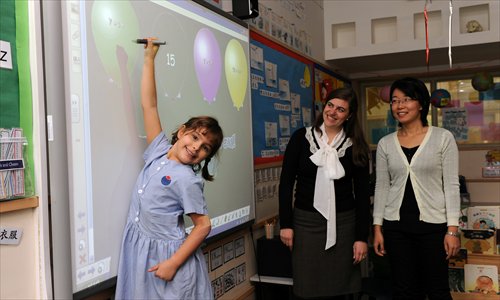HOME >> BUSINESS, METRO BEIJING
YCIS Beijing provides students fine language tools
Source:Global Times Published: 2015-11-23 19:18:01

YCIS Beijing's unique Co-Teaching Model helps to ensure students receive quality bilingual education. Photo: Courtesy of YCIS Beijing
In its 20 years of serving Beijing expat families, Yew Chung International School of Beijing (YCIS Beijing) has produced high achieving students not just in the sphere of traditional Western education, but also in the Chinese language field.Primary school bilingual and bicultural language education
The youngest of students at YCIS Beijing have the greatest and most frequent exposure to Chinese language in all areas of study. In the Early Childhood Education and Primary School sections, YCIS Beijing's unique Co-Teaching Model is on full display. At least a third of all content across all subjects is taught half in Chinese and half in English. While it's potentially challenging logistically, YCIS Beijing employs refined grouping for students, separating each grade into six levels according to their Chinese and English ability, thereby ensuring that each student receives appropriate language aid.
At the heart of each class is YCIS Beijing's Co-Teaching Model, which Western Primary Curriculum Coordinator Jennifer Mills details. "Co-teaching enhances the bilingual learning experience. All co-taught lessons are delivered in both languages," she said. "Students gain valuable insights into 'East meets West' as conceptual lesson content is taught in both languages. They learn in both languages, increase vocabulary, extend their linguistic abilities and are nurtured in both language contexts throughout the lesson."
Chinese and English teachers are treated as equals in the classroom, rather than the Chinese staff member serving the more typical role of teaching assistant.
Cultural co-teaching
The Co-Teaching Model is an excellent vehicle for cultural teaching as well. The Chinese Primary Curriculum Co-ordinator April Peng expanded on more interesting ways in which the Co-Teaching Model is utilized in the classroom.
"Besides learning subjects like math and geography in multiple languages, teachers will also use examples from both Chinese and Western cultures to teach different topics," she said. "For instance, when doing a unit on seafaring explorers, we have had English-speaking teachers talk about Marco Polo (Italian merchant traveler, 1254-1364) in English while the Chinese teacher would teach the students about Zheng He (Chinese mariner, 1371-1433) in Chinese. This unique blend of culture and language in a variety of subjects greatly enhances the value students receive from each lesson."
The model's applications extend far beyond efficient Chinese and English language study. Cultural learning is also applied in a variety of other forms, such as Chinese cultural events.
"Students are able to participate in a number of different cultural activities, ranging from acting in Chinese plays to Chinese poetry reading to even hip-hop dance classes using contemporary Chinese songs," Peng said. "All of these activities help students interact with Chinese culture outside of the classroom and explore the Chinese language."
Through these projects, children can familiarize themselves with China. Their surroundings are no longer viewed as odd or foreign but rather something to be embraced and cherished.
Building on primary language foundations in secondary school
Chinese culture and language learning continues into YCIS Beijing's lower-secondary schooling. Students continue their immersion in Chinese culture and language not just through classroom education but also through "Experience China" trips. These trips will take students to various places throughout China to help them understand the rich and diverse cultural background that the country possesses.
"We believe that the Chinese studies program provides our students with a more in-depth understanding of the country they live in," YCIS Beijing's Secondary Chinese Coordinator Jessica Sun said. "We hope that the program will encourage and motivate students to become more immersed in Chinese culture and their community."
Students who attend YCIS Beijing's upper-secondary program will have the opportunity to further build upon the strong Chinese foundation already laid by their primary- and lower-secondary schooling. Regular Chinese language and culture classes continue through their final years of schooling. In fact, nearly 50 percent of YCIS Beijing's IB (International Baccalaureate diploma program) graduates receive bilingual diplomas, a true testament to the school's multicultural environment.
Posted in: Press Release, Enterprise